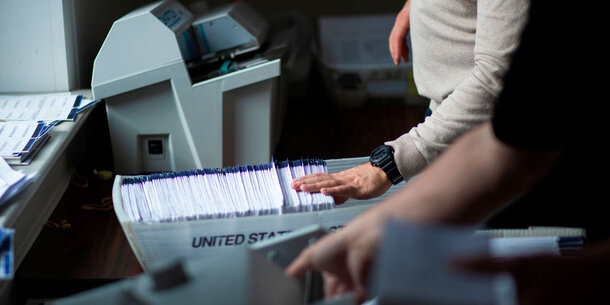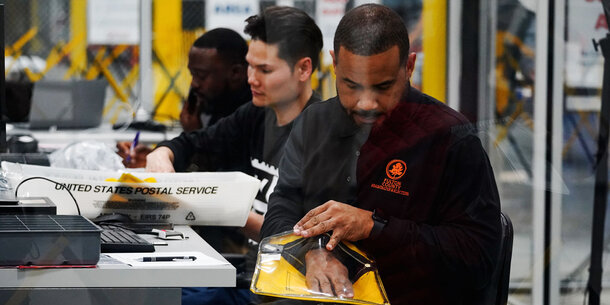Pennsylvania law provides several avenues for political party representatives, candidates, and members of the general public to observe election processes, including voting, counting, canvassing, and auditing processes. These transparency measures help protect the fairness and integrity of elections. Election officials have a duty to uphold these transparency measures and provide observers with access while also protecting against disruptions and overcrowding.
Poll Watchers: Observing the Polls
Party and candidate representatives may serve as poll watchers at polling places. State law provides a number of constraints on who and how many people can serve in this role and what they can do.
For example, each poll watcher must be a qualified registered elector of the county where the election district (polling place) at in which the watcher serves is located.1 Each candidate may appoint two poll watchers for each election district in which the candidate appears on the ballot, and each party may appoint three poll watchers for each election district in which candidates of the party are on the ballot.2 But only one poll watcher for each candidate and party may be present in the polling place at any time.3 Before the election, each poll watcher must obtain a certificate from the county board of elections that states the poll watcher’s name and the name of the candidate or party that they represent.4 Under Pennsylvania law, poll watchers must show their certificates when asked.5
At the polling place, poll watchers can observe by keeping a list of voters, inspecting a numbered list of voters and voting checklist under an election worker’s supervision (and only when there are no voters in the polling place), and making good-faith challenges to a voter’s identity or continued residence in the election district.6 At all times, they must remain outside the enclosed space of the polling place marked off by a guardrail or barrier.7
Authorized Representatives: Observing Absentee and Mail-in Ballot Pre-Canvass and Canvass Meetings
Parties and candidates may each designate one authorized representative to observe the pre-canvass and canvass meetings where mail-in and absentee ballots are counted and recorded.8 Authorized representatives need not be qualified electors in the county, although a poll watcher may serve as an authorized representative if they are designated as such by a party or candidate. Authorized representatives can observe these meetings by, for example, watching the opening of envelopes containing official absentee and mail-in ballots, the counting and recording of absentee and mail-in ballots, and determinations regarding provisional ballots.
Vote Canvass Observers: Observing In-Person Ballot Counting, Canvassing, and Audits
Poll watchers. Poll watchers properly certified by their county board of elections can remain in the polling place after voting is complete to watch the ballot counting and vote machine canvassing process, but they must remain outside the enclosed space of the polling place at all times.9
Observers at sessions of the county board. Pennsylvania law also allows properly certified poll watchers,10 candidates, and attorneys11 to observe county board of elections sessions, including sessions to compute, tabulate, or canvass unofficial election returns on the night of the election, the official computation and canvass sessions that begin on the third day following the election, and post-election audits.12 The county board of elections may limit the number of poll watchers present at any time to no more than three for each party, political body, or body of citizens.13
While Pennsylvania law does not lay out specifics, sessions of the county board of elections are generally open to members of the public who are not official poll watchers, although those individuals do not possess the same rights as watchers.14
Prohibited Behavior for All Observers
Regardless of whether they are an official observer or a member of the general public, all individuals are prohibited by law from intimidating, interfering with, or preventing election workers from performing their election duties.15 Observers similarly cannot interfere with, hinder, or unlawfully delay a district election board or the county board of elections in conducting their duties.16 When observing in-person voting at the polling place, poll watchers cannot engage in electioneering, intimidate voters, or make challenges based on race, national origin, appearance, surname, language, religion, or any other characteristic not relevant to the qualifications to vote.17 And when observing the pre-canvass process, authorized representatives cannot disclose the results of any portion of the pre-canvass prior to the close of the polls, nor can they make challenges to mail-in or absentee ballots based on signature analysis.18
Additional Guardrails
Pennsylvania law requires county officials to “systematically and thoroughly” monitor all election activity to ensure that elections are conducted “honestly, efficiently, and uniformly.”19 County officials are also charged with “mak[ing] and issu[ing] such rules, regulations and instructions, not inconsistent with the law,” that they deem necessary to ensure that elections run smoothly.20 Consistent with these provisions, county officials have broad authority and responsibility to preserve order and safety at polling places and canvass sites. For example, they can:
Promptly remove observers who engage or attempt to engage in prohibited activities. And while election workers may not interfere with poll watchers who properly exercise their privileges as watchers, the judge of elections (chief election worker) at a polling place has a duty to remove those who engage in prohibited activities. If needed, they also may engage law enforcement to handle disturbances.21 If an election official removes an authorized representative from a pre-canvassing or canvassing meeting, the candidate or party may replace the representative.
Set reasonable limits on how many observers may be present at any time. The law strictly limits the number of official watchers and authorized representatives. Election officials can also institute a reasonable cap on the number of members of the public who can observe sessions of the county board of elections at any time, depending on space constraints, and provide for rotation to ensure broad public access.
Endnotes
-
1
25 P.S. § 2687(b). -
2
25 P.S. § 2687(a). -
3
25 P.S. § 2687(b). -
4
Id.; 25 P.S. § 2642(e). -
5
25 P.S. § 2687(b). -
6
Id.; see also 25 § P.S. 3050(d). -
7
25 P.S. § 2687(b). -
8
25 P.S. § 3146.8(g)(2). -
9
25 P.S. § 2687(b). -
10
Pursuant to the law, any “party or political body or body of citizens” entitled to have watchers at any election can appoint watchers to observe sessions of the county board. 25 P.S. § 2650(a). -
11
Each candidate or their “duly authorized attorney” may be present and participate in county board sessions that concern matters affecting their candidacy. 25 P.S. § 2650(b). -
12
25 P.S. §§ 2650, 3031.17. -
13
25 P.S. § 2650(a). -
14
See 25 P.S. § 3154(a), see also, e.g., 3031.14(b)(1). -
15
25 P.S. §§ 3508, 3519, 3527, 3547; see also 52 U.S.C. § 10307(b). -
16
Id.; see also 42 U.S.C. 1985(3). -
17
25 P.S. § 3050(d). -
18
25 P.S. § 3146.8(g)(1.1). -
19
25 P.S. § 2642(g). -
20
25 P.S. § 2642(f). -
21
25 P.S. § 3047.



